The Week in Alternative Fuels
This week’s headlines featured a variety of alternative marine fuels, including biofuels, ammonia and methanol.
 PHOTO: DNV's latest data shows that there were 204 confirmed methanol-fuelled vessels in operation and on order by July. Green Maritime Methanol
PHOTO: DNV's latest data shows that there were 204 confirmed methanol-fuelled vessels in operation and on order by July. Green Maritime Methanol
The IMO urged the shipping sector to reduce greenhouse gas (GHG) emissions by 20% (striving for 30%) by 2030, and by 70% (striving for 80%) by 2040. It aims for net zero emissions "by or around" 2050.
However, Peter Nuttall, who is a scientific and technical advisor at the Micronesian Center for Sustainable Transport, criticised the IMO’s revised strategy and called it an “unnecessary compromise” on 1.5°C ambitions. He also argued that the revision undermined the serious threats posed by climate change to the future of small island nations.
Nevertheless, marine fuels with low- and zero-emission potential like biofuels, methanol and ammonia could help the shipping sector do its part to keep global warming below 2°C – if not below 1.5°C.
Canada-based clean tech company Enerkem teamed up with French engineering company Technip Energies to roll out Enerkem's biofuel technology in Europe, the US and the Middle East. Enerkem's biofuel technology converts non-recyclable wastes such as municipal solid wastes into biofuels and renewable chemicals. The companies said that some of the biofuels produced will cater to shipping demand.
This week’s headlines also featured methanol. Classification society DNV's latest data shows that there were 204 confirmed methanol-fuelled vessels in operation and on order by July, a sharp rise from 156 in June. New orders for methanol-powered vessels have increased fivefold from nine in April to 48 in July.
As another example of methanol's presence in the news, Dutch logistics firm Royal Den Hartogh recently bunkered a new vessel in Rotterdam with a methanol blend from OCI HyFuels. The ship's owner is unknown, but it uses an engine that runs on MD97 – a blend of 97% methanol and 3% additives. MD97 has "diesel-like properties" and should be used in methanol-only engines rather than dual-fuel ones, Royal Den Hartogh claimed. The two companies did not disclose whether the methanol is grey (produced with fossil fuels) or green (produced with renewable energy), which will have implications for its carbon dioxide reduction potential.
Alongside methanol, ammonia is also considered a potential alternative marine fuel. However, the development of ammonia-ready engines is still in its infancy and recent experiences suggest that ammonia engines could consume around 5-20% of diesel as pilot fuel. This would make it difficult for vessels powered by ammonia to transition to zero-emission operations in the near term.
By Konica Bhatt
Here is our selection of top five alternative fuels stories from this week:
INTERVIEW: IMO's revised strategy was detrimental to island nations - Peter Nuttall
Enerkem partners with Technip Energies to deploy waste-to-biofuels technology
Another strong month for methanol-fuelled vessels – DNV
Royal Den Hartogh, OCI team up to bunker a vessel with methanol blend
Will ammonia-fuelled shipping continue to feed fossil fuel demand?






